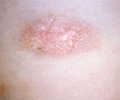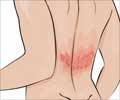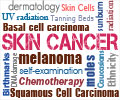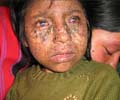Glossary
Actinic keratosis: A precancerous skin growth that occurs on sun-damaged skin.Basal cell carcinoma: The most common form of skin cancer that involves cells in the outer layer of skin.
Biopsy: removal and examination of cells or tissue under a microscope to check for cancer.
Chemotherapy: treatment with anti-cancer drugs.
Dermatologist: a medical doctor who specializes in treatment of skin cancer and other skin diseases.
Dermis: the layer of skin, located under the epidermis.
Epidermis: the outermost layer of skin, which is in contact with the environment, located above the dermis.
Localized: cancer that is limited to one small area of the body and has not spread.
Lymph nodes: clusters of tissue found in the underarms, groin, neck, and other parts of the body that help fight disease. When cancer spreads, they often trap cancer cells.
Malignant: a cancerous growth that may destroy nearby normal tissue and spread to other parts of the body
Melanocytes: skin cells that produce a pigment called melanin and can change into malignant melanoma.
Metastasize: the spread of cancer cells from the original tumor to distant parts of the body.
Mole: a small usually dark skin growth that develops from pigment-producing cells called melanocytes.
Precancerous: a growth that may eventually turn malignant and become cancerous.
Radiation therapy: treatment that uses x-rays and other sources of radiation to kill cancer cells.
Squamous cell carcinoma: cancer that occurs in squamous cells, which are specialized cells near the skin surface that produce protective keratin.
Sunscreen lotion: a lotion, cream or oil that protects the skin from harmful ultraviolet radiation, premature aging, and skin cancer.
Tumor: any abnormal growth of tissue that can be either benign (non-cancerous) or malignant (cancerous).
Ultraviolet radiation: invisible rays in sunlight that cause suntan, sunburn, premature skin aging, and most cases of skin cancer.






























